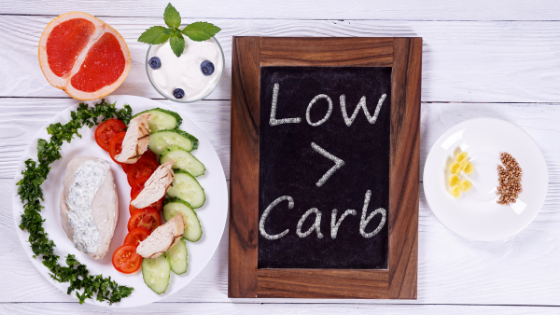


Carbohydrates are the most commonly ingested macronutrient in most diets, followed by protein and fats. Low-carb diets, which have recently gained popularity as a means of weight loss, are an exception.
Continue reading to learn how to ensure that low-carb diets are healthy, as well as their benefits and drawbacks, and how to best incorporate them into your lifestyle.
Maintaining a healthy low carb diet

When carbs are removed from one’s diet, it’s critical to replace them with more calories from protein and fats, as the body still requires energy.
If this does not occur, and a person consumes less than 1k calories per day, it will result in hair loss, brittle nails and skin problems. Because the proteins required for skin, hair, and nails are no longer available, the amino acids (protein building blocks) have been consumed to supply energy.
And that’s why increasing our protein consumption on a low-carb diet is beneficial – we get enough to provide fuel as well as to build structures in the body.
Simultaneously boosting the fat content of the diet is also essential, because fats, which will be used as energy, have their own set of activities like developing cell structures.
When fats are used for energy in a low-carb diet, they are transformed into molecules known as ketone bodies, which replace glucose from carbs and form the foundation of the ketogenic diet.

If you’re wondering why carbs are necessary for brain function after reading this, here’s why: the brain requires glucose to function. Ketone bodies can replace around 70% of the brain’s glucose requirements, but carbs will be required for the remaining 30%. This can be accomplished by taking 50-100 gms of carbs every day.
Advantages Of Low Carb Diet
The primary benefit of low-carb diets is that they aid in weight loss.
Weight loss, regardless of which diet was employed to reduce weight, increases health parameters such as blood pressure, blood cholesterol, triglycerides, and blood sugar response.
Low-carb diets, even if they don’t result in weight loss, have been demonstrated in studies to benefit health. This is (most likely) due to the fact that these diets –
1] Increase Your Protein Consumption

We already know that low-carb diets usually include a lot of protein, which has its own set of health benefits. It helps our bodies burn more calories in a day and increases satiety in a variety of ways.
2] Consume Fewer Calories

Avoiding carbs limits the types of foods we can eat (by eliminating the harmful ones) and may cause us to eat less; yet, because the food is higher in protein and fat, it is still satiating and provides nutrition.
3] Insulin Levels Drop

When carbs are converted to glucose, our bodies produce insulin, a hormone that allows our cells to use the glucose for energy. However, when we have too much insulin, our cells develop resistant to it. Insulin resistance causes metabolic havoc, eventually leading to metabolic syndrome and type-II diabetes, because insulin regulates so many other functions in the body.
Low-carb diets cause our bodies to create less insulin, which has a number of favorable consequences, making them suitable for diabetics as well.
4] Limit Unhealthy Junk Food

Baked items, fried foods, fruit juices, sugary drinks, and other low-nutritive and fatty foods are all prohibited in these diets. Their absence benefits the body in a variety of ways.
Disadvantages Of Low Carb Diet
A low-carb diet has a lot of benefits, but it also has a lot of disadvantages.
1] Not Sustainable

Low-carb diets are difficult to maintain, according to studies, and people may eventually gain weight again. As a result, it’s preferable to keep it as a short-term diet plan (weeks to months) and then follow it up with a more long-term diet plan that can help achieve sustainable health goals.
2] Not Beneficial In Long Term

According to a study, participants who maintained a low-carb diet for 8 weeks & more had a lower stool weight. The diet also reduced the amount of certain beneficial fats produced by our gut bacteria. Both of these things may raise your chances of getting gastrointestinal problems in the long run.
Also, high-protein diets can harm the kidneys by producing too much acid and, according to some research, increasing the incidence of urinary tract stones.
To combat acidity, anyone who consumes a high-protein diet for an extended length of time should consume potassium-rich fruits and vegetables. They should also keep track of their kidney function on a regular basis.
3] There’s a chance that healthy food will be restricted as well.

Low-carb diets prohibit foods that supply high-quality carbs as well, such as fruits, legumes, and wholegrains, which are abundant in numerous health-promoting elements such as phytonutrients, dietary fiber, minerals & vitamins.
4] Physical Performance May Be Affected

Another possible harmful effect of low-carb diets is the depletion of glycogen stores in the body, which is the form of glucose stored in muscles. Low glycogen levels can limit an individual’s exercise ability because glucose is the primary energy source for exercising muscle, however this appears to be a transient impact that passes off after a few weeks once the body has adjusted.
It may nevertheless be unsuitable for athletes or people preparing for an event in which physical performance is required right away.
What Should Be My Carbs Intake?
Here’s how we categorize a diet’s carbohydrate content:

Type of Diet
Diet: Carbs Rich
Diet: Regular
Diet: Moderately Low Carbs
Diet: Low Carbs
Diet: Very Low Carbs
Carbs
(% of total calories)
>65%
45%–65%
26%–44%
16%-25%
5%–15%
You may also figure out how many calories come from carbs by multiplying the number of gms of carbs in the item by 4, as each gms of carb contains 4 calories.
A low-carb diet can help people lose weight, but it’s best to phase it out and replace it with something more sustainable.
Evidence suggests that those with insulin resistance, prediabetes, or metabolic syndrome, should attempt a modestly reduced carb diet.
For the others, as long as you eat a well-balanced diet with plenty of nutritious options, you’ll be well on your way to living a healthy, happy life.
Consult an expert nutritionist on my team at +91-9743430000 who can help you understand and identify foods that works best with your body and help you achieve your health goals.
Ryan Fernando is an Award-winning celebrity Sports Nutritionist with 2GUINNESS world record and 2 Olympic medals under his belt. His client list include Olympic wrestler Sushil Kumar, cricketer Shikhar Dhawan & bollywood superstars Aamir Khan & Abhishek Bachchan. He is Chief Nutritionist at QUA Nutrition Signature Clinics.
©2023 All Rights Reserved Ryan Fernando. Designed and Developed by Floral Web Services